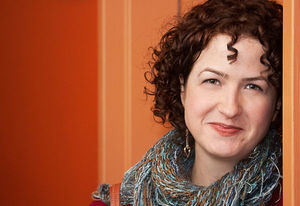Christine McNair on How Life Events Impact Writing & the Seismic Effect of Great Books
Christine McNair's first collection of poetry, Conflict, landed with a big splash: it was a finalist for the City of Ottawa Book Award, the Archibald Lampman Award, and the ReLit Award, and was shortlisted for the Robert Kroetsch Award for Innovative Poetry.
So it's no surprise that readers are excited about her new collection, Charm (BookThug), which takes the same precision and power of her first book and applies it to the craft and process of conception. Whether examining pregnancy and motherhood, the plant-based conception that is pollination, or even the woodcarving of a soon-to-be violin bow, Charm is just otherworldly enough to utterly captivate, while remaining firmly rooted in the work of intimacy and beginnings.
We're happy to welcome Christine to Open Book today as part of our Lucky Seven interview series, where we ask seven questions about an author's newest book. She tells us about how big life events change the writing process for a book, the importance of not being needed while writing, and the seismic impact of a truly great book.
Open Book:
Tell us about your new book and how it came to be.
Christine McNair:
Charm came to be a book in the most hitched crooked way. My idea for a second book (something something fairy tales something something medicine-eugenics) morphed fairly significantly through adding poems on handwork, motherish behaviour, wedded beds, charms, and family. The initial idea threads are there but it coalesced into something far more alchemical than I intended.
OB:
Is there a question that is central to your book, thematically? And if so, did you know the question when you started writing or did it emerge from the writing process?
CM:
Query: what damage does the making and unmaking of things do? Or something of the like. I was originally focused on charmwork but the manuscript deepened to include poems on handwork and mothering. Trying to capture the sleight of hand and muck of these things. I don't think I knew the question at the heart of Charm when I started writing or where the book would end up. There were so many people and things circling me in 2009/2010 that were so completely gone by 2013 when my first child was born. The questions at the core of the book couldn't stay the same after that.
OB:
Did this project change significantly from when you first starting working on it to the final version? How long did the project take from start to finish?
CM:
The book changed as I did. The poems were written over a longer period of time than how I usually tend to work. Poems fell away and the overall themes shifted. It changed fairly significantly through suggestions from some of my favourite poet-readers and then again in the editing process with BookThug and my editor Margaret Christakos.
OB:
What do you need in order to write – in terms of space, food, rituals, writing instruments?
Your CanLit News
Subscribe to Open Book’s newsletter to get local book events, literary content, writing tips, and more in your inbox
CM:
Time. I need time. And quiet. And no one touching me. I love to write when listening to music without words but it's not required. I prefer a computer because my hands are creaky from handwork and it's more efficient than my stilted little letters. I need to be alone. I need not to be needed.
OB:
What do you do if you're feeling discouraged during the writing process? Do you have a method of coping with the difficult points in your projects?
CM:
I talk to my poet-friends and writer-partner. I sometimes find griping through an issue or muddy point with them can shake me out of my stuck boot. I read other people's work. I swear.
OB:
What defines a great book, in your opinion? Tell us about one or two books you consider to be truly great books.
CM:
A great book for me is one that has the capacity to shake and disrupt. I don't care if it's seismic on a macro or micro level but it needs to move. In the case of poetry, there needs to be some attention to sound. It needs to be alive. I have so little patience for pretense and for the underscored boldfaced letters of a line cheaply written (or cheaply read). I also think it's hard to find a truly 'great' or 'terrible' book while there are lots of 'good' books or 'okay' books. Two books I love are Paul Celan's Threadsuns (Joris translation) and Elisabeth Smart's By Grand Central Station I Sat Down and Wept. I need to read those again. I need to read everything over the next few years. There's so much on the shelf that calls to me between latches. I'm so far behind.
OB:
What are you working on now?
CM:
In my head there are two books. One in prose and one in poetry. They are warring. They are further contained underneath a small glass vase within my head as I try to keep out things like pest control contact numbers, documentation, expired film, recipes for salad, blood pressure readings. compartmentalized scripts, black flies, and my children's' shoe sizes.
____________________
Christine McNair is the author of Conflict (BookThug, 2012; finalist for the City of Ottawa Book Award, the Archibald Lampman Award, and the ReLit Award, and shortlisted for the Robert Kroetsch Award for Innovative Poetry) and pleasantries and other misdemeanours (2013; shortlisted for the bpNichol chapbook award). Her work has appeared in Arc Poetry Magazine, CV2, Descant, Poetry is Dead, Prairie Fire, and other places. Her latest book, Charm, is out now from BookThug. McNair lives in Ottawa, where she works as a book doctor.





